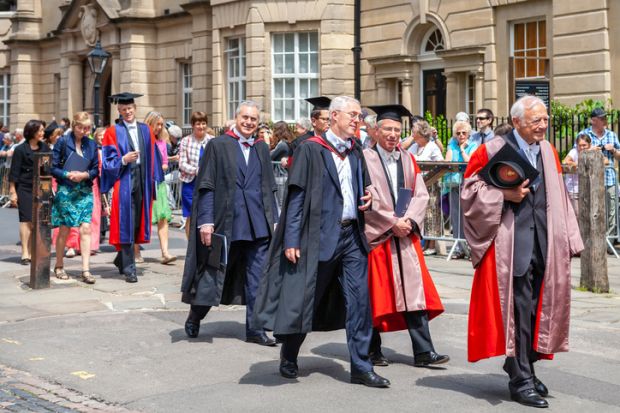The University of Oxford is facing renewed calls to scrap “ageist” rules that force professors to retire at 68 despite dropping the policy for more junior academics.
Plans to remove those who are not professors or associate professors from the remit of the Employer Justified Retirement Age (EJRA) were approved this week after no objections were raised to proposed reforms that will exempt most Oxford staff from the retirement rules.
The decision, which was announced in the Oxford Gazette on 13 October, follows the recommendation of an internal review that found there was “no evidence” that forced retirement was contributing to the aims of the policy – improving diversity, refreshing the workforce and improving “intergenerational fairness” – for staff who are not professors or associate professors.
That change will remove about 4,100 staff at Oxford from the retirement rules, with academic and administrative staff in grades 8, 9 and 10, who are paid annual salaries between £43,414 and £73,787, no longer covered.
It leaves about 1,700 professors, associate professors and other senior researchers still covered by the EJRA, which was introduced in 2011 after national legislation banned compulsory retirement at 65. Only two other UK universities – the universities of Cambridge and St Andrews – have similar rules.
According to Oxford’s 10-year-review, almost half of professors were aged 60 or over in 2021, of which a quarter were likely to want to work beyond the age of 68 based on the previous year. Without the “vacancy creation” permitted by the EJRA, opportunities would be limited for younger and more diverse staff given the “exceptionally low turnover” found in these roles, it says.
In a statement, Oxford said the changes followed “extensive consultation with staff from across the university” and that “transition arrangements will be put in place to ensure fairness in implementing the changes” following the reforms.
However, the policy has faced growing scrutiny after several legal challenges brought by scholars. Last year, Oxford was ordered to pay £30,000 in damages to physicist Paul Ewart and give him his job back after he successfully appealed against his dismissal under the EJRA.
Next month, an employment tribunal will hear the case of a group of Oxford staff, including several professors, who say they were unfairly forced out after they turned 68.
Simon Henthorn, head of education at Doyle Clayton, the solicitors behind the action, told Times Higher Education that the “forced retirement at Oxford of academic-related staff and many research staff aged 68 at the end of last month is clearly unfair”.
“Oxford’s recent review found there was no compelling evidence that the EJRA was achieving the aims of its policy in relation to these members of staff,” he added.
One Oxford scholar in his sixties told THE that many academics had yet to be convinced by the data being used to justify the rule.
“Oxford lost the Ewart tribunal because it was not able convincingly to show there was a ‘greater good’ gain proportional to what would otherwise be unlawful discrimination,” he said.
Calling for an end to the “ageist” rules, he added: “This sorry saga has involved endless stress for elderly academics towards the end of their careers, vast legal fees for the university and potentially hefty compensation payments still to come.
“For many, it is still very unclear just what has been achieved as a ‘greater good’ to justify what has always been a deeply flawed policy.”





